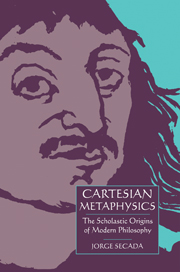Book contents
- Frontmatter
- Contents
- Preface
- Abbreviations
- Prologue
- Part I The unity of Cartesian metaphysics
- 1 Descartes's essentialist metaphysics
- 2 Scepticism, Scholasticism, and the origins of Descartes's philosophy
- 3 Cartesian real essences
- Part II Ideas and the road from essence to existence
- Part III Cartesian substances
- Epilogue
- Notes
- References
- Index
1 - Descartes's essentialist metaphysics
Published online by Cambridge University Press: 22 September 2009
- Frontmatter
- Contents
- Preface
- Abbreviations
- Prologue
- Part I The unity of Cartesian metaphysics
- 1 Descartes's essentialist metaphysics
- 2 Scepticism, Scholasticism, and the origins of Descartes's philosophy
- 3 Cartesian real essences
- Part II Ideas and the road from essence to existence
- Part III Cartesian substances
- Epilogue
- Notes
- References
- Index
Summary
Cartesian essentialism and Scholastic existentialism
Descartes believed that knowledge of a thing's nature is prior to knowledge of its existence. In his replies to Johannes Caterus, the Scholastic author of the First Objections to the Meditations, he stated that ‘according to the rules of true logic we must never ask whether something exists [an est] unless we already know what it is [quid est]’ (AT, VII, 107–8). The same year he wrote to Father Marin Mersenne deprecating ‘theologians who, following ordinary logic, ask whether God exists before asking what His nature is’ (AT, III, 273).
Historians of philosophy have granted little attention to these and similar passages. Some have noted that here Descartes is opposing ‘the School’. But then they have discarded the texts without further consideration, or they have discussed them in passing and exclusively with reference to proofs of God's existence. In either case we have been left without a proper account of their meaning or of their place within the Cartesian corpus.
This neglect is unjustified and needs to be redressed. The view expressed is quite general, neither absurd nor uninteresting, and central to Descartes's metaphysics. The opposite claim that in the order of knowledge existence is prior to essence was indeed one of the most widely and firmly established of Scholastic doctrines.
- Type
- Chapter
- Information
- Cartesian MetaphysicsThe Scholastic Origins of Modern Philosophy, pp. 7 - 26Publisher: Cambridge University PressPrint publication year: 2000



